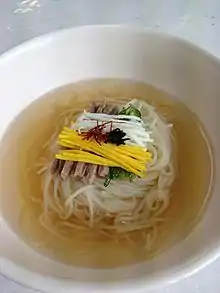Janchi-guksu
Janchi-guksu (Korean: 잔치국수) [2] or banquet noodles[2] is a Korean noodle dish consisting of wheat flour noodles in a light broth made from anchovy and sometimes also dasima (kelp). Beef broth may be substituted for the anchovy broth. It is served with a sauce made from sesame oil, ganjang and small amounts of chili pepper powder and scallions. Thinly sliced jidan (지단, fried egg), gim (laver) and zucchini are added on top of the dish as garnishes.[3] Janchi-guksu have various garnishes with noodles. The word "Janchi" means "feast" in Korean. The name came from where someone can taste it on a feast day such as marriage or one's sixtieth birthday.
 A bowl of janchi-guksu | |
| Alternative names | Banquet noodles |
|---|---|
| Type | Guksu |
| Place of origin | Korea |
| Korean name | |
| Hangul | 잔치국수 |
|---|---|
| Revised Romanization | janchi-guksu[1] |
| McCune–Reischauer | chanch'iguksu |
| IPA | [tɕan.tɕʰi.ɡuk̚.s͈u] |
History
The name derives from the Korean word janchi (잔치, literally "feast" or "banquet"), because the noodle dish has been eaten for special occasions like wedding feasts, birthday parties, or hwangap (60th birthday celebration) throughout Korea. The word guksu means "noodles" in Korean, and noodles symbolise longevity - in life, in a marriage.[4]
There are records of guksu dating back to the Goryeo period. In the book Dongguk Isangguk Jeonjip Book 6 (hangul:동국이상국전집 6, hanja:東國李相國全集) there is a mention of guksu in a line of poetry, and in the book Goryeo Dogyeong (hangul:고려도경, hanja:高麗圖經) written by an envoy from the Chinese Song Dynasty it is mentioned that guksu was eaten on special occasions as wheat was rare and expensive in Goryeo.[5] (The most common ingredients for noodles were buckwheat or starch.)[5]
Popular culture
Because the noodles are traditionally eaten at weddings, the expression "When are you going to feed us guksu?" is a way of asking "When are you going to get married?" and a wedding day might be referred as "a day to eat guksu".[5]
Following the impeachment of Park Geun-hye, many Koreans ate fried chicken and janchi-guksu, which trended on Korean Twitter.[6][7]
See also
References
- "잔치국수". National Institute of Korean Language. Retrieved 2018-02-13.
- (in Korean) "주요 한식명(200개) 로마자 표기 및 번역(영, 중, 일) 표준안" [Standardized Romanizations and Translations (English, Chinese, and Japanese) of (200) Major Korean Dishes] (PDF). National Institute of Korean Language. 2014-07-30. Retrieved 2017-02-15. Lay summary.
- (in Korean) Janchiguksu at Doosan Encyclopedia
- Lee Seong-hui (이성희). "Janchiguksu, blessing for longevity (장수를 기원하는 '잔치국수)" (in Korean). dtnews24.
- (in Korean) Guksu's meaning, Tongil News 2010-05-20. Retrieved 2010-06-19
- http://www.ytn.co.kr/_ln/0103_201703101256578834_001. Missing or empty
|title=(help) - "South Koreans feel like chicken tonight after president's removal". The Guardian. 10 March 2017.
External links
| Wikimedia Commons has media related to Janchiguksu. |
- Janchiguksu recipe at the Koreanline Inc. & YM Production
- (in Korean) Janchiguksu recipe made with beef broth
.jpg.webp)